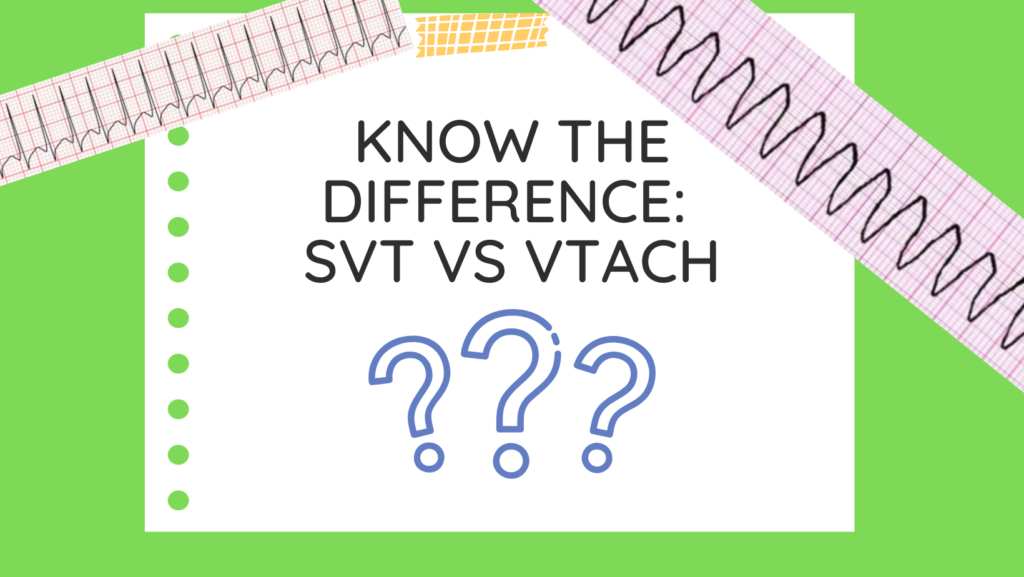
When the heart’s electrical system is disrupted, it can result in abnormal heart rhythms, which can be life-threatening. Two common types of abnormal heart rhythms are supraventricular tachycardia (SVT) and ventricular tachycardia (V-Tach). Let’s explore the differences between these two conditions. It’s critical to understand the difference between SVT and VTach before you take your AHA ACLS Class!
What is SVT?

Supraventricular tachycardia (SVT) is a type of arrhythmia that originates above the ventricles, typically in the atria or the AV node. SVT can cause the heart to beat faster than normal, often at a rate of 150 to 250 beats per minute. Symptoms of SVT may include palpitations, shortness of breath, dizziness, and chest discomfort. In some cases, SVT can be triggered by certain activities or emotions, but in other cases, it may occur spontaneously.
What is V-Tach?

Ventricular tachycardia (V-Tach) is a type of arrhythmia that originates in the ventricles, the lower chambers of the heart. V-Tach is characterized by a rapid heart rate of 100 to 250 beats per minute, and it can cause the heart to beat less efficiently, reducing blood flow to the body’s organs. V-Tach can be life-threatening and requires prompt medical attention. Symptoms of V-Tach may include palpitations, dizziness, fainting, and sudden cardiac arrest.
The Difference between SVT and V-Tach
The main difference between SVT and V-Tach is where the arrhythmia originates. SVT originates above the ventricles, while V-Tach originates in the ventricles. SVT tends to have a regular rhythm, while V-Tach has an irregular rhythm. Additionally, SVT typically has a faster heart rate than V-Tach, with a range of 150 to 250 beats per minute, compared to 100 to 250 beats per minute for V-Tach. Finally, while SVT can be uncomfortable and cause symptoms such as palpitations and shortness of breath, it is generally not life-threatening, unlike V-Tach, which can lead to sudden cardiac arrest.
Treatment of SVT and V-Tach
The treatment of SVT and V-Tach will depend on the underlying cause of the arrhythmia and the severity of the symptoms. First, you should determine whether the patient is stable, unstable, or pulseless. If the patient’s blood pressure is less than 90 mmHg systolic, they are typically considered unstable. This is a general guideline and it can also be helpful to know the patient’s baseline before making a treatment decision. For unstable patients in SVT or (monomorphic) V-Tach, your first treatment should be synchronized cardioversion. Tip to Remember: Unstable gets the cables!
For stable patients, you can start treatment with vagal maneuvers. If unsuccessful, you can move to medications such as adenosine 6mg followed by 12mg if needed.
If a patient is in pulseless V-Tach, immediately start CPR and defibrillate.
Other treatment options for SVT may include medications, such as beta-blockers or calcium channel blockers, or procedures, such as catheter ablation. Treatment options for V-Tach may include medications, implantable cardioverter-defibrillators (ICDs), or catheter ablation.
In conclusion, supraventricular tachycardia (SVT) and ventricular tachycardia (V-Tach) are two common types of arrhythmias that can cause a rapid heartbeat. While both conditions can cause symptoms such as palpitations and dizziness, they differ in their origin, heart rate, and severity. Treatment largely depends on whether the patient is stable or unstable. Always remember to follow the appropriate algorithm when treating the patient! Now that you know the difference between SVT and Vtach, you’re ready to schedule your AHA ACLS class! We have options for first time ACLS students and ACLS renewals. For more info, check out our AHA ACLS Class Schedule and book your class today! All of our ACLS classes are held at our office in Longwood, FL (near Orlando, FL)!

